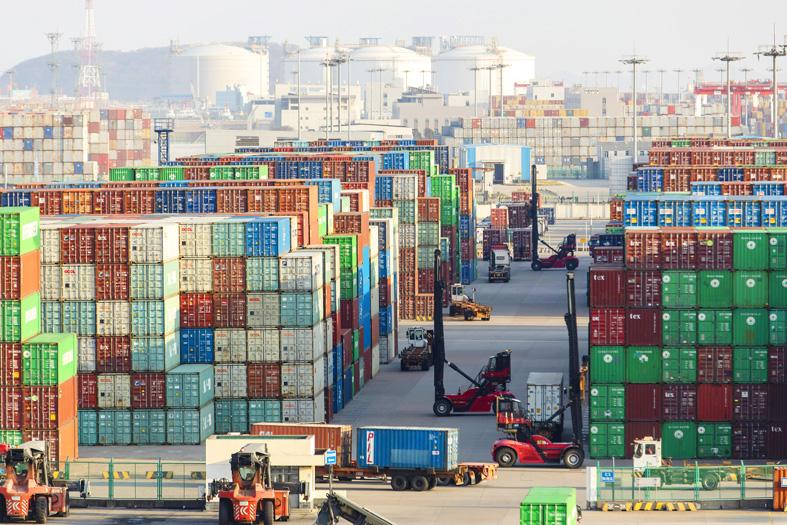Containers carrying frozen food and chemicals are piling up at China’s biggest port in Shanghai, as the city’s lockdown and COVID-19 testing mean truckers cannot get to the docks.
A shortage of trucks to haul containers from the port is impeding the clearance of imports, Ocean Network Express Holdings Ltd (ONE) said in a customer advisory on Wednesday.
While the port is operating normally, a “critically high” numbers of refrigerated containers and items classified as dangerous piled up at two storage yards, which means that some ships carrying those types of cargo might not be able to unload at the port, the company said.

Photo: Bloomberg
Shanghai is the epicenter of China’s worst COVID-19 outbreak in two years, with almost 20,000 new daily cases reported yesterday.
The shortage of trucks is also hitting companies in the city that have been able to continue working through the lockdown, with chip giant Semiconductor Manufacturing International Corp (中芯國際) struggling to secure trucks to ship finished goods.
Truckers form a crucial component of supply chains in China, moving raw materials from coastal ports to factories further inland. The backlog is likely contributing to growing ship waiting lines off China, threatening even more delays and higher freight rates in coming months.
Tightened restrictions on truck drivers in other parts of China are also delaying the delivery and return of containers to ports, freight forwarders said.
There is a possibility that containers of frozen food or hazardous items, such as lithium batteries or chemicals, would not be able to land at Shanghai and would need to be rerouted to other ports, ONE said.
Yantian terminal at the Port of Shenzhen in southern China would halt the collection and delivery of containers at all berths for about two hours yesterday evening to smooth out port operations, the port said in an advisory to customers.
Truckers were advised not to arrive earlier to pick up containers, as they could get held up, it said.
In related news, international airlines have been told to ensure that flights into Shanghai are less than half full as part of the city’s latest attempt to curb the spread of COVID-19, people familiar with the matter said.
Non-Chinese carriers were instructed by the Shanghai Center for Disease Control and Prevention to reduce passenger loads to a maximum of 40 percent starting on Monday until at least the end of the month, the people said.
Capacity on foreign flights has a nationwide ceiling of 75 percent.
Separately, the three airlines flying from Hong Kong to Shanghai — Cathay Pacific Airways Ltd (國泰航空), Hong Kong Airlines Ltd (香港航空) and China Eastern Airlines Corp (中國東方航空) — have been directed to rotate on the route so that they each only fly to the city once every three weeks, a person with knowledge of the situation said.
That change starts from today and would last for an indefinite period, the person said.
A 50 percent cap on the number of passengers on those planes would remain in place, they added.

To many, Tatu City on the outskirts of Nairobi looks like a success. The first city entirely built by a private company to be operational in east Africa, with about 25,000 people living and working there, it accounts for about two-thirds of all foreign investment in Kenya. Its low-tax status has attracted more than 100 businesses including Heineken, coffee brand Dormans, and the biggest call-center and cold-chain transport firms in the region. However, to some local politicians, Tatu City has looked more like a target for extortion. A parade of governors have demanded land worth millions of dollars in exchange

An Indonesian animated movie is smashing regional box office records and could be set for wider success as it prepares to open beyond the Southeast Asian archipelago’s silver screens. Jumbo — a film based on the adventures of main character, Don, a large orphaned Indonesian boy facing bullying at school — last month became the highest-grossing Southeast Asian animated film, raking in more than US$8 million. Released at the end of March to coincide with the Eid holidays after the Islamic fasting month of Ramadan, the movie has hit 8 million ticket sales, the third-highest in Indonesian cinema history, Film

BIG BUCKS: Chairman Wei is expected to receive NT$34.12 million on a proposed NT$5 cash dividend plan, while the National Development Fund would get NT$8.27 billion Taiwan Semiconductor Manufacturing Co (TSMC, 台積電), the world’s largest contract chipmaker, yesterday announced that its board of directors approved US$15.25 billion in capital appropriations for long-term expansion to meet growing demand. The funds are to be used for installing advanced technology and packaging capacity, expanding mature and specialty technology, and constructing fabs with facility systems, TSMC said in a statement. The board also approved a proposal to distribute a NT$5 cash dividend per share, based on first-quarter earnings per share of NT$13.94, it said. That surpasses the NT$4.50 dividend for the fourth quarter of last year. TSMC has said that while it is eager

‘IMMENSE SWAY’: The top 50 companies, based on market cap, shape everything from technology to consumer trends, advisory firm Visual Capitalist said Taiwan Semiconductor Manufacturing Co (TSMC, 台積電) was ranked the 10th-most valuable company globally this year, market information advisory firm Visual Capitalist said. TSMC sat on a market cap of about US$915 billion as of Monday last week, making it the 10th-most valuable company in the world and No. 1 in Asia, the publisher said in its “50 Most Valuable Companies in the World” list. Visual Capitalist described TSMC as the world’s largest dedicated semiconductor foundry operator that rolls out chips for major tech names such as US consumer electronics brand Apple Inc, and artificial intelligence (AI) chip designers Nvidia Corp and Advanced